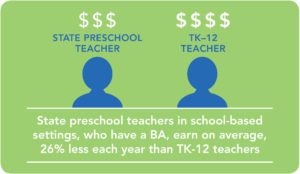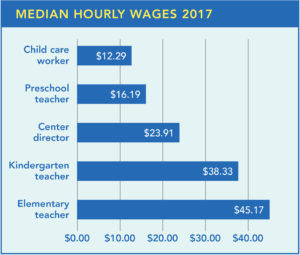Strengthening and Advancing California’s Early Learning Workforce: Recommendations for the Master Plan
A Policy Paper from Early Edge California on California’s Early Learning Workforce
View the Workforce Policy Addendum (Updated 9/10/20): Supporting the Early Learning Workforce through the Coronavirus Pandemic
 A key component of a high-quality Early Learning system is developing a workforce that has the knowledge, skills, and support to provide high-quality care and instruction to young children. Since the publication of the 2015 seminal report, Transforming the Workforce for Children from Birth through Age 8: A Unifying Foundation, momentum has been building both nationally and statewide to professionalize the Early Learning workforce. There is now a strong body of knowledge about what is needed to develop and retain well-prepared Early Learning teachers—yet, until now, California has not sufficiently invested in the infrastructure and resources needed to do so.
A key component of a high-quality Early Learning system is developing a workforce that has the knowledge, skills, and support to provide high-quality care and instruction to young children. Since the publication of the 2015 seminal report, Transforming the Workforce for Children from Birth through Age 8: A Unifying Foundation, momentum has been building both nationally and statewide to professionalize the Early Learning workforce. There is now a strong body of knowledge about what is needed to develop and retain well-prepared Early Learning teachers—yet, until now, California has not sufficiently invested in the infrastructure and resources needed to do so.
 Governor Newsom’s administration has shown unprecedented commitment to working with the California Legislature to build a high-quality Early Learning system in California that meets the needs of our children and their families. Accomplishing this goal will require intentional planning and significant investment to strengthen and advance the more than 200,000 Early Learning teachers across the state.
Governor Newsom’s administration has shown unprecedented commitment to working with the California Legislature to build a high-quality Early Learning system in California that meets the needs of our children and their families. Accomplishing this goal will require intentional planning and significant investment to strengthen and advance the more than 200,000 Early Learning teachers across the state.
The Master Plan for Early Learning and Care—funded in the 2019-20 state budget and to be completed by October 2020—presents a key opportunity for California to develop a comprehensive roadmap to professionalize the state’s Early Learning workforce.
 In our new policy paper, Strengthening and Advancing California’s Early Learning Workforce: Recommendations for the Master Plan, Early Edge California explores the serious challenges that California’s Early Learning teachers currently face—low pay, uneven professional requirements across programs, limited access to high-quality professional development opportunities and career pathways, and lack of ongoing workforce data to inform effective policy. We then make recommendations for the Master Plan to address these challenges and support the development of a highly-skilled Early Learning workforce statewide.
In our new policy paper, Strengthening and Advancing California’s Early Learning Workforce: Recommendations for the Master Plan, Early Edge California explores the serious challenges that California’s Early Learning teachers currently face—low pay, uneven professional requirements across programs, limited access to high-quality professional development opportunities and career pathways, and lack of ongoing workforce data to inform effective policy. We then make recommendations for the Master Plan to address these challenges and support the development of a highly-skilled Early Learning workforce statewide.
To learn more, download a copy of the full paper and its executive summary.
